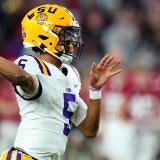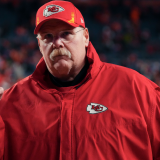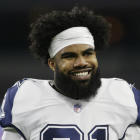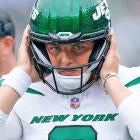Several headlines currently dominate the NFL landscape, but Ezekiel Elliott takes the cake -- along with some sprinkles.
You could make the argument that the fully fractured relationship between the Washington Redskins and left tackle Trent Williams or the Los Angeles Chargers' contract battle with running back Melvin Gordon are right up there with Elliott having been absent from Dallas Cowboys camp as both sides worked to nail down a contract extension, but Gordon isn't in Elliott's stratosphere and Williams -- while an All-Pro talent when healthy -- is on the wrong side of 30, returning from injury and hasn't participated in a full 16-game season since 2013.
This is why one of them is now the highest-paid running back in NFL history, and it's the one in North Texas.
Elliott -- already a two-time All-Pro, a two-time Pro Bowler and a two-time league rushing champ in his first three seasons, and that's despite having missed six games in 2017 due to suspension -- is only 24 years old. The former fourth-overall pick, for all intents and purposes, has been the driving force behind the Cowboys' success since putting on the uniform, and no one in the organization can or has attempted to devalue his role on the team.
We'll get to how things devolved to the point where Elliott felt he needed to hold out to push the issue on his contract, but first, let's quickly touch on where we are now.
Feed Zeke: The deal gets done ahead of Week 1
Barring an unexpected U-turn, this was a deal that was set to land, and finally did -- making him the richest running back in NFL history. Prior to the Sept. 3 agreement and subsequent signing, though, this writing was already on the wall.
The evidence of that came by way of intensifying talks between both sides following the conclusion of the preseason, with Elliott and the Cowboys rapidly approaching terms they could both agree upon. A source with knowledge of the situation confirmed to me the hope was for Elliott to return to the facility on Monday, Sept. 2 -- or not long thereafter -- with enough time to have a full week of practice ahead of the season opener. The Cowboys were reportedly frustrated things didn't get nailed down on Sunday, though, but talks on Saturday were intense and brought both sides very near closing, which finally happened on Wednesday morning.
According to Adam Schefter, Elliott traveled with his agent Rocky Arceneaux on Tuesday from Cabo to Dallas and all signs pointed then to a new contract being "very close."
According to Todd Archer, after arriving in Dallas, Arceneaux confirmed the two sides were "very, very close" to coming to a long-term contract agreement.
"I think Zeke is showing he's committed by coming back to Dallas We didn't come here not to do a deal," Arceneaux told Archer.
Later, Arceneaux added that he believes Elliott is in game shape and will be able to play in Week 1 vs. the New York Giants.
Elliott has now officially signed his contract and reported for his first practice since minicamp in June, and everyone on all sides is all smiles. That especially goes for owner Jerry Jones, who finally admitted Elliott is the most valuable player on the roster, and how that made him OK with being "$100 million dollars lighter" because of it.
The Cowboys and Elliott now close the chapter on a tumultuous offseason, and walk hand-in-hand into the next decade together.
Want to know more about how the Ezekiel Elliott extension came together? Below you'll find everything we reported in this space throughout the process.
How the Cowboys fumbled before 2019
Let's hop in the DeLorean and time travel a few months back in time the 2018 season, when the groundwork for what we saw this offseason was being laid -- even if inadvertently.
The team suffered a rough start to the year thanks to an uneven offense led by longtime coordinator Scott Linehan, and one that failed to match the intensity of a top-five defensive unit. Unwilling to install consistent pre-snap misdirection and the refusal to utilize the mobility of quarterback Dak Prescott allowed teams to truly key in on loading the box to stop Elliott. That was met with calls to run him constantly up the A and B gap in spite of the traffic, and while Elliott leads the league in yards after contact on a regular basis -- it was still a brutalizing task that would add up physically over the course of the season.
It wasn't until the addition of Amari Cooper in Week 8 via trade that opposing defenses were forced to back off and play honest football, and the mix of Cooper and Elliott turned into gunpowder for the Cowboys; the team blasted off from a lowly 3-5 start to win seven of their final eight games. Something was still not quite right, though, as evidenced in Elliott battling through a noticeable limp over the course of late November into mid-December.
Forever the consummate competitor, he continued to ask for more, but that's not what his body wanted. It needed Linehan and the Cowboys to strike some sort of balance, which would include figuring out how to buoy a passing attack that ranked as one of the worst in the league.
That never happened.
Why Elliott had leverage
Yes, feeding Elliott a hefty portion of snaps is ideal and essentially a requirement for the consistent success of the Cowboys' offense but, in reality, the team went too far on the back end of the season. What they did was the equivalent of strapping Elliott to an unvarnished chair and shoving a tube down his throat, followed by turning on a food pump. They denied the signs of a battered Elliott, and demanded he produce that much more when Cooper's blazing hot start with the team cooled noticeably.
To his credit, he did just that, delivering 754 rushing yards and 341 receiving yards from Week 10 through Week 16. These are monster numbers by any measure, but for a player who was also nursing a bad ankle and hadn't missed a single start because of it, they serve as a keen reminder of just how alien of a talent Elliott is.
When looking at the offensive plan over his last seven regular season games, however, the fact Elliott's total touches plus targets add to a sum of 209 -- a chunky average of 29.85 per game -- can be considered overkill when also factoring in how he's on the field for decoy and pass blocking reps as well, and helps to apply perspective for why he wants to be paid now and not potentially two seasons later. Entering the Week 15 contest against the Indianapolis Colts, Elliott led in the NFL in touches from scrimmage, having 43 more than Todd Gurley, 53 more than Saquon Barkley, 81 more than David Johnson and a whopping 93 more touches than Christian McCaffrey. Elliott had touched the football 160 times in the previous six games alone, including 40 touches in Week 14 against the Philadelphia Eagles.
It's common knowledge that RBs have a shorter shelf life than most other positions, if not all others entirely, so Elliott wasn't keen to look at what's occurred in his first three years and opt to wait another year or two before securing his future. He wants to at least have a shot at the type of tenured career future Hall of Famer Frank Gore is having, and things will have to change to achieve that sort of legacy.
Shedding Linehan and promoting a more creative Kellen Moore to coordinator offer hope, as does drafting flex talent Tony Pollard and bringing back veteran Alfred Morris to challenge for an RB2 role that could help spell Elliott as needed, but the promise of managing Elliott better to lengthen his career is a projection and not a guarantee. What is known and verifiable is how much he means to the team's offense (and defense, by virtue of controlling time of possession), and how much punishment he's had to take and dish out to average 101.2 rushing yards per game and climb to 5,247 yards from scrimmage in just 42 regular season games.
Elliott would never let his frustration with Linehan and the decrepit offensive plan show, but it was there.
It also didn't help smooth things over with Elliott by taking him off of the field in the red zone after riding him down the field to get there, or not utilizing him at all within the 20-yard range when he was on the field, which led to him being outclassed by Los Angeles Rams halfback Todd Gurley in the TD category. Elliott was only able to produce nine total touchdowns in 15 games, while Gurley amassed 21 in one game fewer. When you compare how Rams head coach Sean McVay used Gurley in the red zone versus Linehan's refusal to consistently do so with Elliott -- over the past three seasons, in totality -- you'll note how drastically different the two approaches have been.
Elliott is capable of doing what Gurley and New York Jets running back Le'Veon Bell have done over the course of their respective careers, but he was never asked to, and that lack of production had the Cowboys trying to keep him as close to Gurley's contract numbers as possible. Gurley signed a four-year, $60 million extension with $45 million guaranteed before his contract season in 2018.
Why did Elliott 'jump the line?'
Considering both Prescott and Cooper have had offers in front of them for quite awhile now but are refusing to sign as both play the market -- which works in their favor, but not Elliott's -- those asking why the latter would want to "jump the line" have their answer. It's simple, really, when you consider "the line" isn't about who everyone thinks should be paid first, but rather who is ready to get their deal done.
Prescott isn't. Cooper isn't. Elliott is.
And with $24.5 million in salary cap space and the ability to create more by extending Cooper to lessen his $13.9 million cap hit for 2019, the money for new deals is sitting on the table -- with only one remaining tier-A player stepping up to claim his portion.
As the old adage goes: You feed who's hungry right now.
The Cowboys did have some leverage in the situation, considering they went to bat for him in the federal court war against the NFL and commissioner Roger Goodell in 2017. The league went on to win that fight, and then punished owner Jerry Jones with a $2.1 million financial penalty for his part in driving up the court costs by lengthening the appeal. Elliott became a model citizen off the field thereafter, launching youth football camps -- amongst other charitable acts -- along with becoming a more vocal and polished leader in the locker room, but another hiccup arrived this past spring by way of an incident in Las Vegas when Elliott went toe to toe with a security guard at a music festival.
He was detained but not arrested, released by law enforcement and it was later ruled by Goodell -- following a public apology via Twitter -- there was no violation of the league's personal conduct policy. Elliott dodged a bullet in that capacity, but more shots are being fired his way with the alleged Vegas victim deciding to press charges 55 days after the incident, and the alleged victim of a 2017 vehicle accident that involved Elliott now suing him and the Cowboys for $20 million -- claiming the team conspired with Frisco Police to cover up the magnitude of the incident.
Frisco PD, who is not named in the suit filed two years later and one year after a failed attempt at suing Elliott for $1 million, has since issued a statement that sheds light on the situation. They state everyone at the scene was offered but denied medical treatment, and although the accuser claims the Cowboys were negligent in allowing Elliott use of the vehicle involved, it turns out the Cowboys didn't own the vehicle. By the rule of Texas law, Elliott can be sued for any damages his insurance does not cover in the incident, and proving there's $20 million worth of damage or that there's a conspiracy involving law enforcement is a tall task.
Still, it's yet another headline Elliott finds himself in and -- fair or not -- the court of public opinion swings leverage from it toward the Cowboys. Team exec Stephen Jones noted from training camp that everything comes up in a negotiation with players, and you can bet all of this did as well.
It's a chess match every superstar goes through when it's time to ask for a bigger check.
Cowboys were prepped for the worst
Patience is the name of the game in any NFL negotiation, and this one was no different.
Sources close to the situation tell me both sides remained calm and optimistic about the talks, and things were moving in the right direction. While nothing was imminent as of last week, there had been no stalls or outright fractures in the process, but there were still items to hammer out with guaranteed money, average annual salary and general language in the contract.
There's a date many keyed in on, which is Aug. 6, because Elliott is set to lose an accrued season toward free agency for not reporting to camp in Oxnard (Calif.) before that NFL deadline. For Elliott, however, it was of no consequence as he sought to land a new deal before the expiration of his fifth-year option anyway.
To put it plainly, it doesn't matter that he wouldn't qualify for unrestricted free agency in 2021 if he signed a new deal in 2019 or 2020. Although the Cowboys weren't expecting to ink Elliott until the spring of 2020 at the earliest, they changed gears to honor his value. The preseason plan for Elliott remained unchanged from 2017 and 2018 -- wherein he didn't take a single snap in August -- so missing those four games for the Cowboys is irrelevant.
As long as things were settled and he showed up before the season opener against the Giants, there would more or less be no harm and no foul, and with Elliott signing on Wednesday, that's exactly what happened.
Dez Bryant fed up, goes to bat for Ezekiel Elliott
Players from around the league, both current and former, spoke out in defense of Elliott for weeks. While Bryant himself has made his stance known a time or two, after hearing the Jerry Jones "accepts" Cowboys might play games without Ezekiel Elliott, but says "he can't miss them all" that continues attempts at devaluing Elliott -- while also admitting the Cowboys are "better with Zeke" -- the former All-Pro wide receiver and all-time Cowboys franchise leader in touchdowns has had enough. He took to Twitter to rail against the narrative, including cheering on Elliott's decision to hold out as a means of forcing the Cowboys to prove their loyalty.
Bryant joins Hall of Fame running back Marshall Faulk and reigning Rookie of the Year Saquon Barkley as current and former players to jump in front of the train aimed at Elliott.
Fantasy ramifications of extension
In August, I reached out to three of the brightest fantasy minds here at CBS Sports to get their insight on what a Elliott holdout would mean. Heath Cummings took the angle of what signing by Week 1 would mean, saying that he expected Ezekiel Elliott to be the No. 1 RB in non-PPR and No. 2 in PPR.
Dave Richard answered the biggest questions fantasy owners should have after seeing Elliott's new deal, which you can check out right here.
How Elliott affects Super Bowl odds
The elder Jones found himself on the defensive after a comment that was taken out of context, wherein he noted NFL teams don't need a rushing champ to win the Super Bowl. Context was important when listening to what he said, but the headlines had already parsed his words and it was all framed as a slight to Elliott. That could not have been further from the truth, as Jones later made clear with a scathing delivery, but it's also key to note that while other teams have won a Lombardi trophy without a leading rusher, Jones has not.
All three of his Super Bowl victories with the Cowboys have included Emmitt Smith leading the league in rushing yards.
For the sake of being thorough, though, what would not having Elliott do for the Cowboys' odds of playing the the Big Game come February? According to Stephen Oh of SportsLine, their chances at making the playoffs don't change much with Elliott is present and accounted for on Week 1, although they'd have a better chance if he's playing games. The odds aren't being kind to the team overall, however, putting their chances at making the playoffs slightly below 50 percent -- and that's with Elliott.
The Westgate had the Cowboys at 20-to-1 to win the Super Bowl as of Wednesday afternoon, with a win total of nine (-110 on both the over and under), +160 odds to win the NFC East and +105 odds to make the playoffs.
























